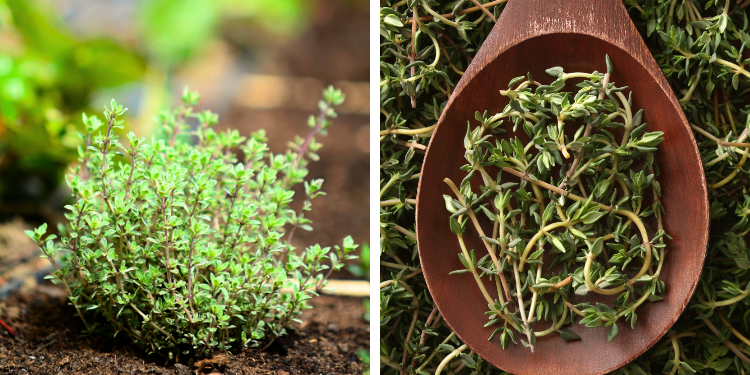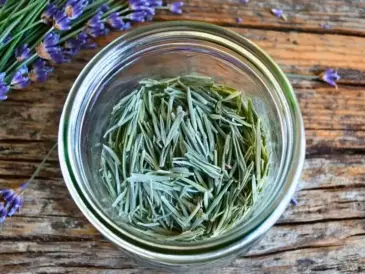Thyme may be one of the smallest herbs in your spice rack, but its healing power is anything but small.
For centuries, thyme has been celebrated as one of nature’s most potent medicinal plants – capable of strengthening the immune system, fighting infections, soothing coughs, improving digestion, and even supporting mental clarity.
A Brief Look at Thyme’s Medicinal Power
Thyme belongs to the mint family (Lamiaceae) and has been used in medicine for over 2,000 years.
Ancient Egyptians used it for embalming, Greeks burned it in temples for purification, and Romans believed it brought courage and strength.
Modern science has confirmed what our ancestors already knew – thyme is packed with antioxidants, vitamins, and essential oils that offer powerful antibacterial, antiviral, and anti-inflammatory effects.
The key compounds behind its healing potential are:
- Thymol – a natural antiseptic that kills harmful microbes
- Carvacrol – an anti-inflammatory and antifungal compound
- Rosmarinic acid – a strong antioxidant that supports immunity and reduces inflammation
- Vitamin C and A – crucial for immune defense and skin health
1. Strengthens the Immune System
Thyme is one of the most effective herbs for boosting immunity. Its antibacterial and antiviral properties help your body fend off seasonal infections, colds, and flu.
Why it works: Thymol and carvacrol in thyme destroy bacteria and viruses before they spread. The herb also increases white blood cell production and strengthens the body’s defense mechanisms.
How to use:
- Brew thyme tea by steeping a teaspoon of dried thyme in hot water for 10 minutes.
- Add honey and lemon for extra immune support.
- Drink 1–2 cups daily during cold season.
2. Relieves Coughs and Clears Congestion
If you’re dealing with a cough, sore throat, or chest congestion, thyme is one of the best natural remedies you can find.
Why it works: Thyme acts as a natural expectorant, helping to loosen mucus and clear the respiratory tract. Studies show thyme extract can reduce coughing fits and improve airflow in people with bronchitis or asthma.
How to use:
- Boil fresh or dried thyme in water to make a soothing herbal steam – inhale deeply for 5–10 minutes.
- Mix thyme tea with honey to calm throat irritation.
- Add a few drops of thyme essential oil to a diffuser to ease breathing.
3. Fights Bacteria, Viruses, and Fungal Infections
Thyme’s natural oils have been proven to combat a wide range of pathogens – including E. coli, Salmonella, and Staphylococcus aureus.
Why it works: Thymol is one of the strongest natural antiseptics known to science. It damages bacterial cell membranes and prevents fungal growth, including Candida albicans – a yeast responsible for infections in the mouth, skin, and gut.
How to use:
- Use diluted thyme essential oil on minor cuts or skin infections.
- Drink thyme tea regularly to support internal cleansing.
- Add fresh thyme to cooking for daily antimicrobial protection.
4. Supports Heart Health
Thyme helps maintain a healthy heart by improving blood flow and reducing blood pressure. Its antioxidants also help protect against oxidative stress – one of the main causes of cardiovascular disease.
Why it works: Thyme contains flavonoids and rosmarinic acid, which relax blood vessels and lower cholesterol levels. It also prevents platelet clumping, which can reduce the risk of clots.
How to use:
- Use fresh thyme as a seasoning instead of salt to help control sodium intake.
- Drink thyme tea daily to help regulate blood pressure naturally.
5. Improves Mood and Reduces Stress
Thyme isn’t just good for the body – it’s also beneficial for the mind. The herb contains carvacrol, a compound known to influence serotonin and dopamine levels – neurotransmitters that control mood and happiness.
Why it works: Regular exposure to thyme’s aroma or consumption of thyme-infused foods can reduce stress, anxiety, and fatigue while improving focus and mental clarity.
How to use:
- Add a few drops of thyme essential oil to a diffuser or bath for relaxation.
- Sip thyme tea before bed to calm the nervous system.
6. Aids Digestion and Gut Health
Thyme has long been used as a digestive tonic. It helps stimulate the production of digestive enzymes, reduces bloating, and prevents gas buildup.
Why it works: Thymol helps balance gut bacteria and prevents the overgrowth of harmful microbes, supporting a healthy microbiome. It also relieves cramping and nausea.
How to use:
- Drink thyme tea after meals to soothe digestion.
- Add fresh thyme to soups and stews to promote gentle detoxification.
7. Supports Healthy Skin and Wound Healing
Thyme is rich in antibacterial and anti-inflammatory compounds that promote clearer, healthier skin. It can also speed up the healing of wounds, cuts, and acne.
Why it works: Thymol fights skin infections, while antioxidants protect against free radicals that cause premature aging. Thyme’s mild astringent effect also helps tighten pores and reduce oil production.
How to use:
- Mix diluted thyme essential oil with coconut oil and apply to acne-prone areas.
- Use thyme-infused water as a natural facial toner.
8. Strengthens Bones and Connective Tissues
Few people know that thyme is an excellent source of vitamin K, calcium, and manganese – nutrients vital for strong bones and connective tissue repair.
Why it works: Vitamin K activates proteins that bind calcium to bone structure, while manganese supports collagen production.
How to use: Incorporate fresh thyme regularly into soups, sauces, or salads for a flavorful calcium and antioxidant boost.
9. Supports Hormonal Balance and Menstrual Health
Thyme may help regulate hormones and relieve menstrual discomfort. Its natural compounds are known to gently influence progesterone levels and ease muscle cramps.
Why it works: Carvacrol and thymol work as natural antispasmodics, helping relax uterine muscles and reduce bloating or mood swings.
How to use:
- Drink thyme tea during your menstrual cycle for relief.
- Combine thyme with chamomile or ginger for added comfort.
10. Boosts Overall Detox and Cleansing
Thyme acts as a gentle natural detoxifier by supporting liver function, kidney filtration, and lymphatic drainage. Its antioxidants help neutralize toxins and flush them from the body.
Why it works: Regular thyme intake supports the body’s natural detox pathways, improving energy levels, skin clarity, and overall vitality.
How to use: Add thyme to your detox smoothies, herbal teas, or homemade tonics for a refreshing cleansing boost.
How to Use Thyme Daily
There are many ways to incorporate thyme into your daily wellness routine:
- Fresh thyme: Sprinkle over roasted vegetables, soups, or salads.
- Thyme tea: Brew 1 tsp dried thyme in hot water for 10 minutes.
- Thyme essential oil: Diffuse or apply (diluted) for antimicrobial and mood-boosting benefits.
- Thyme-infused honey: Mix thyme sprigs into raw honey and let it steep for 2 weeks for a soothing throat remedy.
Precautions
Thyme is safe for most people, but excessive intake can cause mild stomach irritation.
- Pregnant or breastfeeding women should consult a doctor before using concentrated thyme oil.
- Always dilute essential oils before topical use.
From boosting immunity and soothing coughs to healing skin and supporting digestion, thyme truly is one of nature’s most versatile healing herbs.
What may seem like a humble kitchen ingredient is, in fact, a powerful natural medicine that can transform your health when used consistently.




